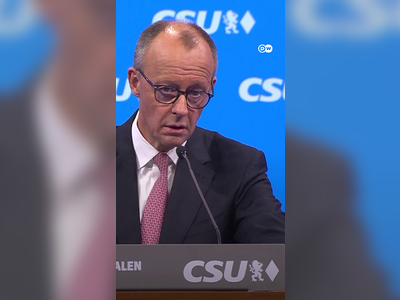Germany's Manufacturing Sector Faces Decline Amid Intensifying China Competition
Challenges arise as industrial production falls, influenced by geopolitical tensions and shifts in global manufacturing dynamics.
Germany's manufacturing sector is experiencing a troubling downturn, characterized by a five-year decline in industrial production that endangers approximately 5.5 million jobs and threatens up to 20% of the nation's gross domestic product (GDP).
This scenario has been underscored by a report from an independent think tank based in London.
The ongoing conflict in Ukraine has necessitated a significant shift in Germany's energy sourcing, prompting a reduced dependency on Russian energy supplies.
This transition has resulted in soaring energy prices, further complicating matters for crucial sectors such as chemicals and steel.
Moreover, supply chain disruptions stemming from the COVID-19 pandemic have negatively affected demand for German exports.
Concurrently, China's evolution from low-cost manufacturing to high-tech industry has accelerated, driven by the 'Made in China 2025' initiative aimed at establishing global leadership in advanced manufacturing and technology.
This strategy directly challenges Germany's historical strengths in industries such as automotive production, clean technology, and mechanical engineering.
Germany’s automotive sector faces increasing scrutiny regarding its perceived sluggish pace in adopting electric vehicles (EVs) and embracing innovation.
Chinese automotive brands, including SAIC Motor and BYD, are intensifying competition in this arena, prompting fears of significant job losses and potential plant closures within Germany.
In the chemicals arena, Chinese manufacturers have markedly expanded their production capabilities, particularly in polyethylene and polypropylene, creating a scenario of global oversupply that has pressured profit margins for major German firms, including BASF.
Over the last decade, China's chemical exports to the European Union have surged by 60%, while Germany's exports have declined by more than 14%.
Germany’s mechanical engineering sector, renowned for its precision and quality, is also contending with heightened competition.
The country's share of global industrial machinery exports decreased slightly from 15.2% in recent years, while China's share rose from 14.3% to 22.1%.
A crucial factor facilitating China's competitive edge is the substantial financial support provided to key industries, which was estimated at around €221 billion (approximately $242 billion) in 2019. This state support has enabled Chinese manufacturers to maintain lower production costs, allowing them to undercut Western competitors effectively.
A survey commissioned by the German Chamber of Commerce in China indicates that over half of German companies operating in the Chinese market foresee their Chinese counterparts emerging as leaders in innovation within the next five years.
The report suggests concerns about Germany's recognition and adaptation to the evolving global landscape.
Experts assert that Germany stands at a critical point where it may need to reevaluate its trade and industrial policies to preserve its position as a manufacturing leader.
Proposed strategies include advocating for the European Union to apply trade defenses, such as tariffs on heavily subsidized Chinese exports, and encouraging the exploration of alternative markets for German automotive and high-tech machinery products.
In addition, a planned defense and infrastructure spending initiative estimated at nearly €1 trillion over the next twelve years has raised apprehensions that an overemphasis on military capabilities could divert necessary investments from emerging industrial sectors.
Nonetheless, observers maintain that Germany retains vital strengths, particularly in research and development, suggesting potential pathways for innovation.
The evolving competitive landscape underscores a transformation where traditional industry boundaries are blurred, increasingly intersecting with advancing technology firms.
As companies navigate this rapidly shifting environment, adaptability remains a key challenge in an era of unprecedented global competition.
This scenario has been underscored by a report from an independent think tank based in London.
The ongoing conflict in Ukraine has necessitated a significant shift in Germany's energy sourcing, prompting a reduced dependency on Russian energy supplies.
This transition has resulted in soaring energy prices, further complicating matters for crucial sectors such as chemicals and steel.
Moreover, supply chain disruptions stemming from the COVID-19 pandemic have negatively affected demand for German exports.
Concurrently, China's evolution from low-cost manufacturing to high-tech industry has accelerated, driven by the 'Made in China 2025' initiative aimed at establishing global leadership in advanced manufacturing and technology.
This strategy directly challenges Germany's historical strengths in industries such as automotive production, clean technology, and mechanical engineering.
Germany’s automotive sector faces increasing scrutiny regarding its perceived sluggish pace in adopting electric vehicles (EVs) and embracing innovation.
Chinese automotive brands, including SAIC Motor and BYD, are intensifying competition in this arena, prompting fears of significant job losses and potential plant closures within Germany.
In the chemicals arena, Chinese manufacturers have markedly expanded their production capabilities, particularly in polyethylene and polypropylene, creating a scenario of global oversupply that has pressured profit margins for major German firms, including BASF.
Over the last decade, China's chemical exports to the European Union have surged by 60%, while Germany's exports have declined by more than 14%.
Germany’s mechanical engineering sector, renowned for its precision and quality, is also contending with heightened competition.
The country's share of global industrial machinery exports decreased slightly from 15.2% in recent years, while China's share rose from 14.3% to 22.1%.
A crucial factor facilitating China's competitive edge is the substantial financial support provided to key industries, which was estimated at around €221 billion (approximately $242 billion) in 2019. This state support has enabled Chinese manufacturers to maintain lower production costs, allowing them to undercut Western competitors effectively.
A survey commissioned by the German Chamber of Commerce in China indicates that over half of German companies operating in the Chinese market foresee their Chinese counterparts emerging as leaders in innovation within the next five years.
The report suggests concerns about Germany's recognition and adaptation to the evolving global landscape.
Experts assert that Germany stands at a critical point where it may need to reevaluate its trade and industrial policies to preserve its position as a manufacturing leader.
Proposed strategies include advocating for the European Union to apply trade defenses, such as tariffs on heavily subsidized Chinese exports, and encouraging the exploration of alternative markets for German automotive and high-tech machinery products.
In addition, a planned defense and infrastructure spending initiative estimated at nearly €1 trillion over the next twelve years has raised apprehensions that an overemphasis on military capabilities could divert necessary investments from emerging industrial sectors.
Nonetheless, observers maintain that Germany retains vital strengths, particularly in research and development, suggesting potential pathways for innovation.
The evolving competitive landscape underscores a transformation where traditional industry boundaries are blurred, increasingly intersecting with advancing technology firms.
As companies navigate this rapidly shifting environment, adaptability remains a key challenge in an era of unprecedented global competition.
AI Disclaimer: An advanced artificial intelligence (AI) system generated the content of this page on its own. This innovative technology conducts extensive research from a variety of reliable sources, performs rigorous fact-checking and verification, cleans up and balances biased or manipulated content, and presents a minimal factual summary that is just enough yet essential for you to function as an informed and educated citizen. Please keep in mind, however, that this system is an evolving technology, and as a result, the article may contain accidental inaccuracies or errors. We urge you to help us improve our site by reporting any inaccuracies you find using the "Contact Us" link at the bottom of this page. Your helpful feedback helps us improve our system and deliver more precise content. When you find an article of interest here, please look for the full and extensive coverage of this topic in traditional news sources, as they are written by professional journalists that we try to support, not replace. We appreciate your understanding and assistance.











